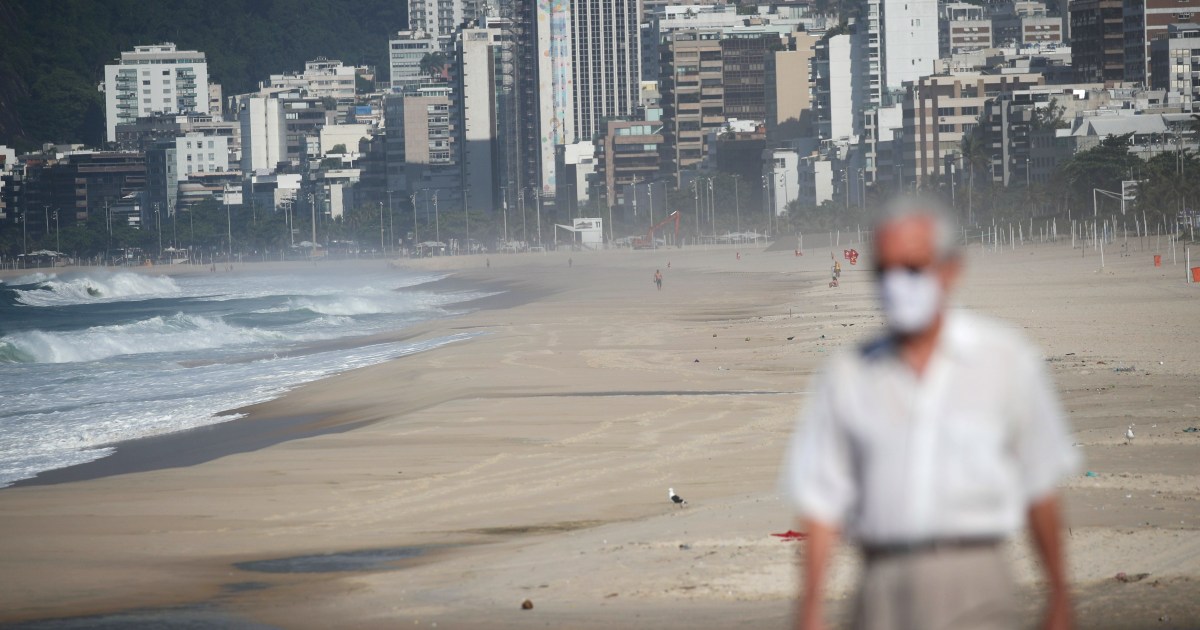Brazil is in talks with the United States to import excess COVID-19 vaccines, Brazil’s Ministry of Foreign Affairs said on Saturday, as the South American nation struggles to contain the increase in coronavirus infections and deaths.
The ministry tweeted that, together with the Brazilian embassy in Washington, it has been in negotiations with the United States government since March 13 “to allow Brazil to import vaccines from the surplus available in the United States”.
The announcement came after US President Joe Biden’s administration said on Thursday that it would “borrow” 2.5 million doses of AstraZeneca’s COVID-19 vaccine for Mexico and 1.5 million other doses for Canada amid an excess of doses.
President Jair Bolsonaro’s government is facing increasing pressure to respond to the way his government has dealt with the COVID-19 pandemic, as well as the slow distribution of vaccines.
The country is experiencing an outbreak of coronavirus infections and deaths, as more than 290,000 people have died since the pandemic began – the second highest count in the world after the United States.
More than 11.8 million cases of COVID-19 have been reported in Brazil to date, according to data from Johns Hopkins University.
Since March 13, the Brazilian government, through the Foreign Ministry and the Embassy in Washington, in coordination with the Ministry of Health, has been negotiating with the United States government for Brazil to import vaccines from the surplus available in the United States.
– Itamaraty Brasil 🇧🇷 (@Itamaraty_EN) March 20, 2021
On Saturday, the health ministry said 79,069 new cases were reported in the previous 24-hour period, along with 2,438 additional coronavirus-related deaths.
The country’s health care network is also close to collapse in several parts of the country, as state and local authorities have tried in recent weeks to impose stricter restrictions in an effort to stem the spread of the virus.
Rio de Janeiro’s beaches were closed to the public over the weekend, with Mayor Eduardo Paes urging residents to stay home amid what he described as a “very difficult” situation.
“We are either aware of this and respect lives, or we are going to live in an uncontrollable situation in the next few days,” he added, while police officers positioned themselves in front of the beaches of Copacabana, Ipanema and Barra de Tijuca.
It was the first time that Rio’s beaches have closed to the public since the reopening in July last year.
The governor of the state of São Paulo, João Doria, earlier this month, also imposed a two-week “red code” block, closing non-essential deals and restricting other services.
The measures drew some protests across Brazil, while law enforcement authorities interrupted large meetings that violated the restrictions.
Daniel Schweimler of Al Jazeera, reporting from Buenos Aires, said on Saturday that the problem is that there have been conflicting statements and measures by political leaders across Brazil.
While the mayor of Rio de Janeiro closed the beaches, Schweimler said that Bolsonaro encouraged people to “take as much vitamin D and sun as possible, as he says this is the best way to fight the coronavirus”.
“So you really have a big political problem: those who are imposing measures to try to fight the pandemic, and the president and his allies saying that they are doing a good job, are handling it as best they can, it is not their fault and it really encourages people to do business normally, ”reported Schweimler.
Bolsonaro, a COVID-19 skeptic who avoided public health measures and downplayed the threat of the coronavirus, asked the Brazilian Supreme Court to override blocking orders, local media reported on Friday.
“They are imposing a state of siege, which is unconstitutional. They cannot do this without Congressional approval. They are humiliating the population and saying that they are saving lives. As they may be saving lives, they are starving, ”said Bolsonaro.
 Brazilian President Jair Bolsonaro has faced criticism for his government dealing with the pandemic [File: Ueslei Marcelino/Reuters]
Brazilian President Jair Bolsonaro has faced criticism for his government dealing with the pandemic [File: Ueslei Marcelino/Reuters]
The far-right president last week appointed Brazil’s fourth health minister since the start of the pandemic, saying that the country is entering a “more aggressive” phase in the fight against the virus.
Marcelo Queiroga, a cardiologist, has Prometheus to carry out Bolsonaro’s policies.
Meanwhile, the Brazilian government has struggled to administer the COVID-19 vaccines, issuing at least one dose to about 5.4% of the population so far.
In January, Brazil approved two vaccines for emergency use: the British AstraZeneca and the Chinese CoronaVac.
The country said last week that it ordered 100 million doses of the Pfizer-BioNTech vaccine and 38 million from Johnson & Johnson, while negotiating 13 million doses of the vaccine from Moderna Inc.
